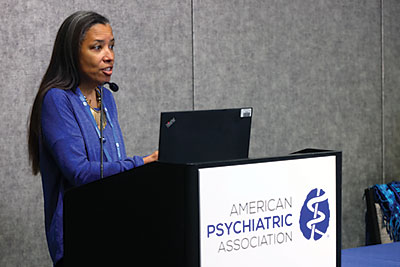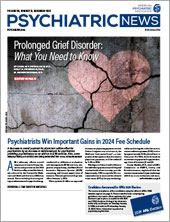Sacha Agrawal, M.D., was completing a psychiatry fellowship at Yale School of Medicine in 2011 when he first became aware of the insight a person who has the lived experience of mental illness can offer to health teams.
As Agrawal relayed to attendees during a session at the 2023 Mental Health Services Conference, his journey to understanding the role of peer specialists started when he was assigned Maria Edwards as a mentor. Edwards had overcome schizophrenia, addiction, and homelessness and had worked as a peer support specialist for more than a decade. At the time that she was asked to mentor Agrawal, she had just been promoted to peer support team leader.
Even though Agrawal had wanted to work with a peer support specialist, he admitted that he had a hard time taking Maria seriously at first, given his ingrained biases about people with serious mental illness. Over the course of a year, however, the pair bonded and each gained insight into the life of the other, as they
chronicled in a
Psychiatric Services article in 2013.
Agrawal, who is now an assistant professor of psychiatry at the University of Toronto, also used his experience to help develop an
educational program that pairs psychiatry residents with peer specialists as a means of understanding recovery and reducing negative stereotypes of mental illness.
“We can’t keep training physicians the same way as before and expect to get care with dignity and respect at the fore,” he said.
Such interactions are important for changing the power dynamics in medicine, explained Stephanie Le Melle, M.D., director of public psychiatry education at Columbia University Medical Center. She spoke at the session about the school’s
public psychiatry fellowship, which is the first psychiatry program in the United States to adopt the Toronto model.
Columbia’s fellowship trains psychiatrists to see patient care as recovery-focused and social justice–informed. “We encourage doctors to give up some of their power in order to empower others,” she told the audience.
In this one-year program, fellows split their time between theory (didactic education about public psychiatry) and practice (being an attending psychiatrist in centers serving people with complex needs, such as those living in subsidized housing or those in prison).
As part of the education component of the program, each of the 10 annual fellows is paired with a certified peer support specialist with lived experience. Fellows and specialists then meet in pairs for an hour each month for open discussion.
In addition to these one-on-one conversations, there are periodic group discussions on challenging topics, such as the ethics of involuntary commitment. At the end of each fellowship year, both fellows and peer advisors write a narrative about their experience and share what they have learned.
“I am not just helping someone, we are co-learning,” Antonio Munõz-Hilliard, a peer support specialist at Mount Sinai Morningside in New York, told session attendees.
After years of sharing his journey with mental illness and substance use, Munõz-Hilliard started to question the importance of his role on health teams, he said. He began to think “my story is only important to me,” he recalled.
By the end of his first year participating in Columbia’s public psychiatry fellowship, however, he felt stronger and wiser, and has since been a fixture in the program.
“These relationships are real, and that’s how true healing takes place,” said Le Melle. ■

